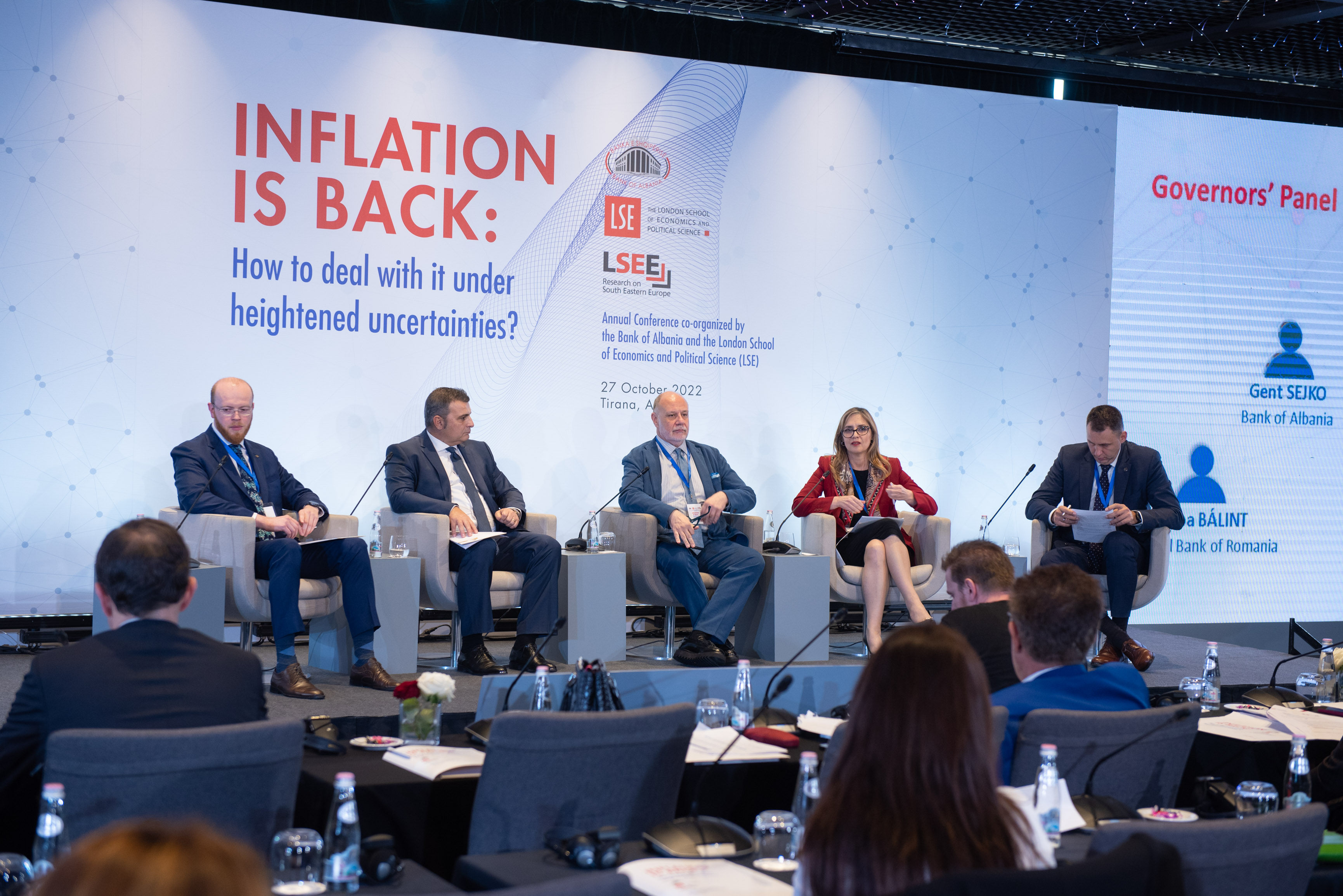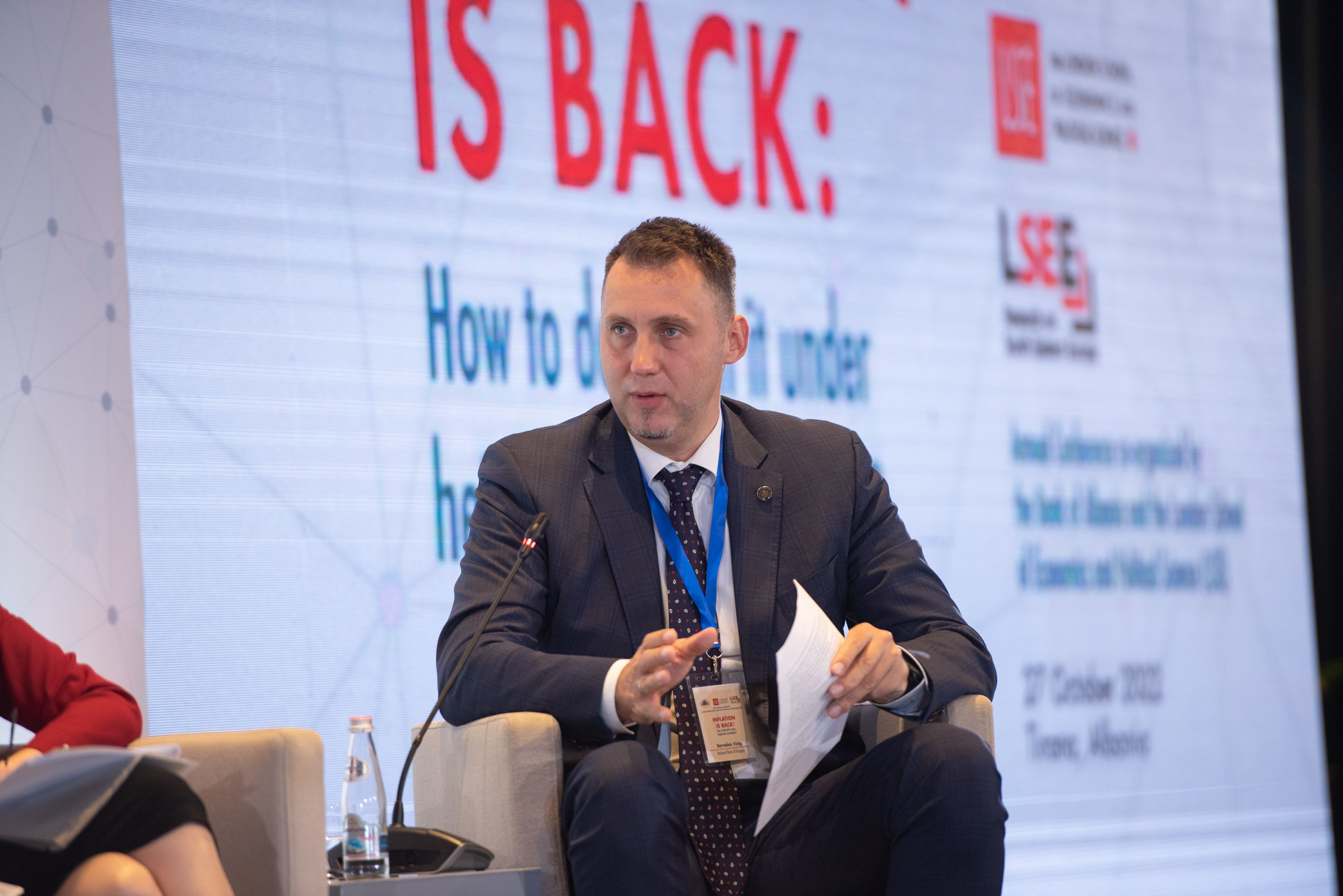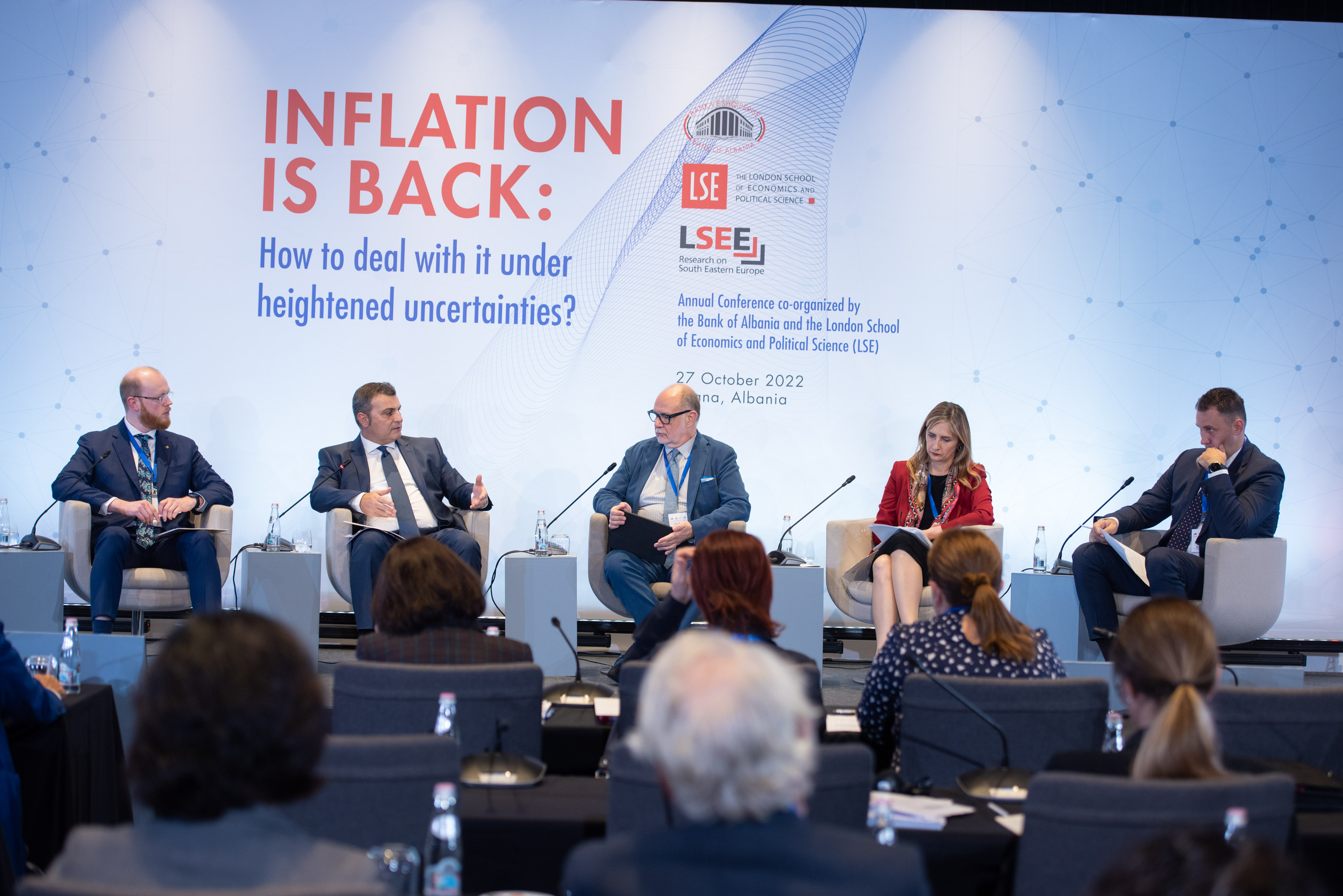BANK OF ALBANIA
PRESS RELEASE
Bank of Albania Annual Conference 2022: Conclusions
Publication date: 27.10.2022
The Bank of Albania co-organised with the London School of Economics and Political Science -LSE (the annual conference: “Inflation is Back: How to Deal with It under Heightened Uncertainties?”, on 27 October 2022.

This is the 16th Annual Conference of the Bank of Albania and the third year co-organised with the London School of Economics and Political Science (LSE), among the top 10 universities in the world in the field of social, economic, political and international studies.

A closed-doors roundtable on: “Southern-Eastern Europe (SEE) challenges on the way of the European Union integration and increased geopolitical risks “, preceded the Conference. Chaired by the Governor of the Bank of Albania, Mr Gent Sejko, the roundtable focused on the EU integration and membership challenges in the current geopolitical context; the regional macroeconomic and financial stability outlook; the Fallout of Europe’s energy crisis and its impact on the region.

The first panel of the conference addressed the current inflation surge, its main drivers in both advanced and emerging economies, as well as the role and policy toolbox of central banks to respond and react against these developments. In an overview of the current macroeconomic developments, the panellists discussed on the supply-side shocks and their contribution to global inflation, where the gas and energy prices, and their transmission into the other production and labour costs have mainly driven inflation picking up. In addition, we operate in a macroeconomic and financial environment with heightened uncertainties which affect the current and expected performance of inflation and the main macroeconomic indicators, where the geopolitical play a significant role.

In response to these developments and uncertainties, central banks have mainly reacted through the raise of the policy rate. Nevertheless, the monetary policy reaction should consider the heterogeneity across countries, their features, related to the debt level and the determining factors of the economic growth in these countries. The trilemma “inflation, primary balance sheet and policy rate” makes difficult the decision taking of central banks in this new macro-economic reality. In periods of crisis, central banks should strengthen, more than ever, their independence, responsibility and credibility to safeguard the main objective of central banks, price stability. The panellists pointed out that central banks, nowadays, are in better situations, in terms of both instruments and policies, and they should react more rapidly and with a higher determination to meet these objectives. In addition, under unprecedented circumstances, a better coordination between monetary and fiscal authorities is required, aimed at overcoming these problems.

In the spirit of the conclusions in the first panel, which identified the monetary policy reaction and normalisation, the second panel focused on the objectives of central banks; their evolution in time and in line with global developments, like the global financial crisis, the lingering pandemic aftermath, and then the effects arising from the ongoing war in Ukraine. The role of central bank, what can be done without endangering the independence, and the inclusion of other objectives -like climate changes, migration, and the technological innovation impact on the economy- were also discussed in this session. Focusing on only one objective will help central banks to strengthen confidentiality and succeed in achieving and maintaining their main objective pursuant to their legal mandate. However, central banks should also analyse, assess and pay attention on the rest of other objectives for the purposes of their reaction to enrich the indicators and risks map that central banks analyse, to minimise its losses and maximise the welfare of the society. The recent global financial crisis once more emphasised and brought into light the macro-prudential policies and their role related to financial stability. In the context of this new environment, monetary policy and financial stability should be better coordinated for the purposes of price and financial stability.

The Closing Panel with the Governors’ Round table brought together in a discussion panel, the Governor of the Bank of Albania, Mr Sejko; the Governor of the National Bank of the Republic of North Macedonia, Ms Anita Angelovska Bezhoska; the Deputy Governor of the National Bank of Hungary, Mr Barnabás Virág; Member of the Board of Directors, National Bank of Romania, Mr Csaba Bálint, moderated by Mr Cristian Popa, Former Senior Advisor to the Vienna Initiative Steering Committee and Former Deputy Governor of the National Bank of Romania.

The Governor's panel provided a summary of the recent macroeconomic and inflationary developments, and the reaction of central banks in a new environment with additional foreign uncertainties, and domestic economic weaknesses, which pose more difficulties to the monetary policy’ s reaction of the central bank, which have as primary objective the price stability and the financial system stability. Central banks should find a balance between both objectives to avoid the pro-cyclical effects on the financial system. The world may change on an ongoing basis, for we should be prepared to pro-actively react to avoid the second-round effects.

Decision-makers should coordinate the policies and the decision taking in a timely manner in compliance with their legal mandate. In these regard, we should take immediate, gradual measures, but not extreme one. Emerging countries should pay attention to the liquidity management practices, the exchange rate to manage and anchor inflation expectations and created more sustainability. Central banks should also consider the climate changes and their effects in terms of price stability and financial system stability.
Central banks have a lot on their plates, but they have to boost public’s awareness, by communicating their actions, and increasing financial education and literacy. In addition, as small and open economies, conditioned by the global developments, the better coordination and harmonisation of monetary and fiscal policies will drive to a better achievement of objectives for any authority towards a more sustainable growth.

 Twitter
Twitter
 Youtube
Youtube
 Facebook
Facebook
 Flickr
Flickr
 RSS
RSS
 Subscribe
Subscribe
 Feedback
Feedback